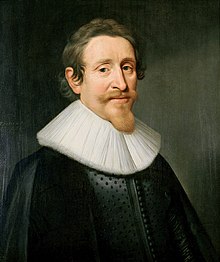Named after the Dutch legal theorist Hugo Grotius (1583-1645).
Concepts of law and justice can be applied to international society in the manner implied in the work of Grotius, and can find expression in the practice of collective security.
Source:
Graham Evans and Jeffrey Newnham, The Dictionary of World Politics (Hemel Hempstead, 1990)
|
Hugo Grotius
|
|
|---|---|

Portrait of Hugo Grotius
by Michiel Jansz. van Mierevelt, 1631 |
|
| Born | 10 April 1583
Delft, Holland, Dutch Republic
|
| Died | 28 August 1645 (aged 62)
Rostock, Swedish Pomerania
|
| Alma mater | Leiden University |
| Era | Renaissance philosophy |
| Region | Western philosophy |
| School | Natural law |
| Academic advisors | Justus Lipsius |
|
Main interests
|
Philosophy of war, international law, political philosophy |
|
Notable ideas
|
Theory of natural rights, grounding just war principles in natural law, governmental theory of atonement |
Hugo Grotius (/ˈɡroʊʃiəs/; 10 April 1583 – 28 August 1645), also known as Huig de Groot (Dutch: [ˈɦœyɣ də ɣroːt]) and in Dutch as Hugo de Groot (Dutch: [ˈɦyɣoː də ɣroːt]), was a Dutch humanist, diplomat, lawyer, theologian, jurist, poet and playwright.
A teenage intellectual prodigy, he was born in Delft and studied at Leiden University. He was imprisoned for his involvement in the intra-Calvinist disputes of the Dutch Republic, but escaped hidden in a chest of books. Grotius wrote most of his major works in exile in France.
Hugo Grotius was a major figure in the fields of philosophy, political theory and law during the sixteenth and seventeenth century. Along with the earlier works of Francisco de Vitoria and Alberico Gentili, he laid the foundations for international law, based on natural law in its Protestant side. Two of his books have had a lasting impact in the field of international law: De jure belli ac pacis [On the Law of War and Peace] dedicated to Louis XIII of France and the Mare Liberum [The Free Seas]. Grotius has also contributed significantly to the evolution of the notion of rights. Before him, rights were above all perceived as attached to objects; after him, they are seen as belonging to persons, as the expression of an ability to act or as a means of realizing something.
It is thought that Hugo Grotius was not the first to formulate the international society doctrine, but he was one of the first to define expressly the idea of one society of states, governed not by force or warfare but by actual laws and mutual agreement to enforce those laws. As Hedley Bull declared in 1990: “The idea of international society which Grotius propounded was given concrete expression in the Peace of Westphalia, and Grotius may be considered the intellectual father of this first general peace settlement of modern times.”[2] Additionally, his contributions to Arminian theology helped provide the seeds for later Arminian-based movements, such as Methodism and Pentecostalism; Grotius is acknowledged as a significant figure in the Arminian-Calvinist debate. Because of his theological underpinning of free trade, he is also considered an “economic theologist”.[3]
Grotius was also a playwright, and poet. His thinking returned to the forefront after the First World War.

Have you ever considered about including a little bit more than just your articles? I mean, what you say is fundamental and all. Nevertheless imagine if you added some great pictures or videos to give your posts more, “pop”! Your content is excellent but with pics and clips, this blog could undeniably be one of the greatest in its field. Fantastic blog!
Respect to author, some great entropy.